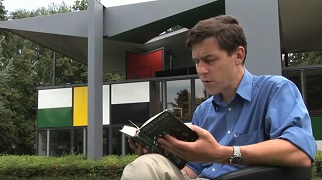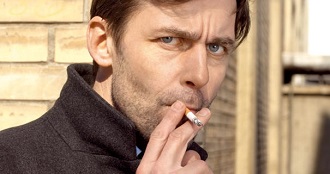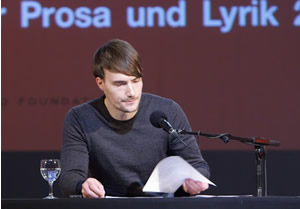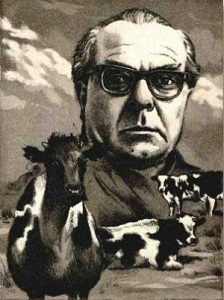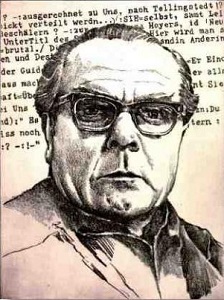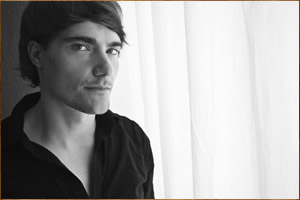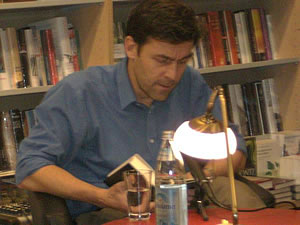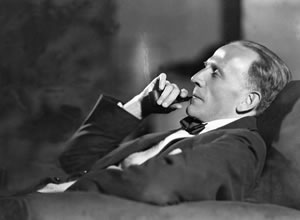De Zwitserse schrijver Peter Stamm werd geboren op 18 januari 1963 in Weinfelden. Zie ook alle tags voor Peter Stamm op dit blog.
Uit: Die sanfte Gleichgültigkeit der Welt
„Magdalena musste sich über meine Nachricht gewundert haben. Ich hatte keine Telefonnummer und keine Adresse angegeben, nur die Zeit und den Ort und meinen Vornamen: Bitte kommen Sie morgen um vierzehn Uhr zum Skogskyrkogården. Ich möchte Ihnen eine Geschichte erzählen. Ich wartete beim Ausgang der S-Bahn-Station auf sie. Um Viertel nach zwei war sie noch nicht da, und ich dachte kurz, sie könnte ein Taxi genommen haben. Aber ihre Verspätung hatte nichts zu bedeuten, sie war immer unpünktlich gewesen, nicht auf die aggressive Art, die dem Wartenden zeigen soll, dass seine Zeit weniger wert ist als ihre, eher aus einer Art Zerstreutheit, mit der sie ihr ganzes Leben anging. Ich war sicher, dass sie kommen würde, dass ihre Neugier größer sein würde als ihr Misstrauen. Fünf Minuten später fuhr der nächste Zug ein, und als ich schon dachte, sie sei auch in diesem nicht gewesen, kam sie mit hüpfenden Schritten die Treppe herunter. Ich hatte mich gleich zu erkennen geben wollen, aber kaum sah ich sie, verschlug es mir wieder den Atem wie am Tag zuvor, als ich ihr vor dem Hotel aufgelauert und sie dann doch nicht angesprochen hatte. Sie musste bald dreißig sein, zwanzig Jahre jünger als ich, aber sie sah aus wie ein junges Mädchen, und wer uns zusammen begegnet wäre, hätte glauben können, wir seien Vater und Tochter. Ich ließ sie an mir vorüber- gehen, ohne sie anzusprechen, und folgte ihr in Richtung Friedhof. Sie wirkte nicht wie jemand, der verabredet ist. Sie ging mit schnellen Schritten die Straße hinunter, als sei sie den Weg schon hundertmal gegangen. Ich hatte angenommen, sie werde beim Eingang des Gelän- des warten, aber sie ging hinein und, ohne zu zögern, einen kleinen Hügel hoch, auf dem ein Kreis alter Bäume stand. Am Fuß des Hügels gab es ein riesiges Steinkreuz, dennoch hatte die Anlage etwas Heidnisches, die Landschaft und die Natur wirkten stärker als die sakralen Bauten und alle christlichen Symbole.
Magdalena hatte sich oben auf dem Hügel unter einen der kahlen Bäume gesetzt und schaute mir entgegen, als hätten wir ein Wettrennen gemacht und sie sei die Siegerin. Außer Atem kam ich bei ihr an, und obwohl sie mich noch nie gesehen hatte, schien sie sofort zu wissen, dass ich es war, der sie hierherbestellt hatte. Lena, sagte sie und streckte mir die Hand hin. Christoph, sagte ich und gab ihr etwas irritiert die Hand. Nicht Magdalena? Niemand nennt mich so, sagte sie mit einem Lächeln. Ein ungewöhnlicher Ort für ein Treffen. Ich wollte, dass wir ungestört reden können, sagte ich.“
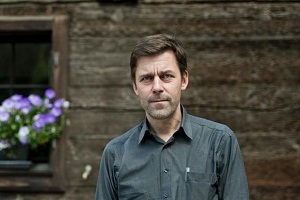
Peter Stamm (Weinfelden, 18 januari 1963)
De Duitse dichter, schrijver en fotograaf Sascha Kokot werd geboren op 18 januari 1982 in Osterburg. Zie ook alle tags voor Sascha Kokot op dit blog.
das Bettzeug bleibt liegen
das Bettzeug bleibt liegen
für ein paar Tage
als gefiederter Abdruck
meiner Bewegung in diesem
Streitfall zwei Meter über
dem Boden schwelt es weiter
wühlen die Kinder deins
und meins darin umher
spielen Burg oder Grotte
so dick gepolstert tut ihnen
nichts weh liegen sie nicht
wund auf diesem Schlachtfeld
die Kinder sind uns abhandengekommen
die Kinder sind uns abhandengekommen
wir kennen ihre Namen nicht
es blieb keine Zeit sie auszuwählen einzustudieren
ihre Zimmer bleiben unbezogen
unsere Körper gehen darin brach
einander unsicher gegenüber
weisen sie uns immer weiter fort
sie scheinen die Routen verlässlich zu kennen
auch wenn wir kaum mehr wissen
was uns hier hält in den kalten Fluren

Sascha Kokot (Osterburg, 18 januari 1982)
De Oostenrijkse schrijver, vertaler en uitgever Franz Blei werd geboren op 18 januari 1871 in Wenen. Zie ook alle tags voor Franz Blei op dit blog.
Uit: Das große Bestiarium der modernen Literatur
Die George
Die George, auch die große George genannt, ist ein hochbeiniger Watvogel, der durch die außerordentlich schöne Proportion seiner Glieder wie auch durch seine Größe weit über seine Genossen im Wasser hinausragt, die es ihm mit Strecken und Recken ihrer kurzen mißgeformten Glieder gleichtun wollen zum großen Vergnügen der zuschauenden Kinder. Aber die George nimmt solches Stelzen der andern lächelnd hin, weil es ihr ihre Einzigartigkeit und Mustergültigkeit beweist. Die George hat Töne, die sie nur im Gehen von sich gibt, und es bekommen diese vom wohlgeordneten Spiel der Glieder eine gefällige Rhythmik. Das Gesicht der George ist von geringem Umfang und wird von ihren Beinen beherrscht, insofern ihr Sehen darüber nicht hinausgeht. Ihr subtiler Organismus macht sie Krankheiten geneigt, die leicht chronisch, aber nicht gefährlich werden. So ist die George dauernd mit der leichten Indisposition einer Wolfskehl behaftet. Den Schmitz, den sie einmal am Bein hatte, hat sie rasch überwunden. Einen irritierenden Gerardy ist sie aber so wenig los geworden wie an ihrer linken Pfote einen Gundelfinger, der sich da breit macht.
Gide, André
ist ein zartgebauter Schüler des Port Royal, aus ihm entsprungen und seitdem – es ist leicht, aus einer Stadt zu entfliehen, aber schwer, dann die rechte Straße zu finden – seitdem müht sich dieses vom Port Royal sublimierte Gewissen um Weg und Wege zwischen Genf und Paris, Rom und Moskau. Es flüchtet bisweilen erschöpft in Gärten, vergeblich von Blumen derbe Früchte dieser Erde erwartend. Oder es eilt ins Parisische und trinkt sich ein ganz kleines Voltairesches Schwippschen an. Manchmal auch bleibt es zwischen Paris und Genf in der Provinz liegen. Die Saiten dieser Kunst, eine Zuflucht, sind über eine offene Wunde seiner Seele gespannt; er schlägt sie wie es nur möglich ist: diskret und mit peinlichster Gewissenhaftigkeit.
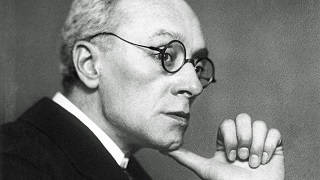
Franz Blei (18 januari 1871 – 10 juli 1942)
De Engelse dichter en letterkundige Jon Stallworthy werd geboren op 18 januari 1935 in Londen. Zie ook alle tags voor Jon Stallworthy op dit blog.
No Ordinary Sunday
No ordinary Sunday. First the light
falling dead through dormitory windows blind
with fog; and then, at breakfast, every plate
stained with the small, red cotton flower; and no
sixpence for pocket money. Greatcoats, lined
by the right, marched from their pegs, with slow
poppy fires smouldering in one lapel
to light us through the fallen cloud. Behind
that handkerchief sobbed the quick Sunday bell.
A granite cross, the school field underfoot,
inaudible prayers, hymn-sheets that stirred
too loudly in the hand. When hymns ran out,
silence, like silt, lay round so wide and deep
it seemed that winter held its breath. We heard
only the river talking in its sleep:
until the bugler flexed his lips, and sound
cutting the fog cleanly like a bird,
circled and sang out over the bandaged ground.
Then, low-voiced, the headmaster called the roll
of those who could not answer; every name
suffixed with honour — ‘double first’, ‘kept goal
for Cambridge’ — and a death — in Spitfires, tanks,
and ships torpedoed. At his call there came through
the mist blond heroes in broad ranks
with rainbows struggling on their chests. Ahead
of us, in strict step, as we idled home
marched the formations of the towering dead.
November again, and the bugles blown
in a tropical Holy Trinity,
the heroes today stand further off, grown
smaller but distinct. They flash no medals, keep
no ranks: through Last Post and Reveille
their chins loll on their chests, like birds asleep.
Only when the long, last note ascends
upon the wings of kites, some two or three
look up: and have the faces of my friends.

Jon Stallworthy (18 januari 1935 – 19 november 2014)
Cover
De Franse schrijver en filosoof Charles Louis de Secondat, baron de La Brède et de Montesqieu werd geboren op 18 januari 1689 op het kasteel La Brède bij Bordeaux. Zie ook alle tags voor Montesquieu op dit blog.
Uit: Considérations sur les causes de la grandeur des Romains et de leur décadence
“La ville n’avait pas même de rues, si l’on n’appelle de ce nom la conti¬nuation des chemins qui y aboutissaient. Les maisons étaient placées sans ordre et très petites : car les hommes, toujours au travail ou dans la place publique, ne se tenaient guère dans les maisons.
Mais la grandeur de Rome parut bientôt dans ses édifices publics. Les ouvrages qui ont donné et qui donnent encore aujourd’hui la plus haute idée de sa puissance ont été faits sous les Rois. On commençait déjà à bâtir la ville éternelle.
Romulus et ses successeurs furent presque toujours en guerre avec leurs voisins pour avoir des citoyens, des femmes ou des terres. Ils revenaient dans la ville avec les dépouilles des peuples vaincus : c’étaient des gerbes de blé et des troupeaux ; cela y causait une grande joie. Voilà l’origine des triomphes, qui furent dans la suite la principale cause des grandeurs où cette ville parvint.
Rome accrut beaucoup ses forces par son union avec les Sabins, peuples durs et belliqueux comme les Lacédémoniens, dont ils étaient descendus. Romulus prit leur bouclier, qui était large, au lieu du petit bouclier argien, dont il s’était servi jusqu’alors, et on doit remarquer que ce qui a le plus contribué à rendre les Romains les maîtres du monde, c’est qu’ayant combattu successivement contre tous les peuples ils ont toujours renoncé à leurs usages sitôt qu’ils en ont trouvé de meilleurs.
On pensait alors dans les républiques d’Italie que les traités qu’elles avaient faits avec un roi ne les obligeaient point envers son successeur ; c’était pour elles une espèce de droit des gens. Ainsi tout ce qui avait été soumis par un roi de Rome se prétendait libre sous un autre, et les guerres naissaient toujours des guerres.
Le règne de Numa, long et pacifique, était très propre à laisser Rome dans sa médiocrité, et, si elle eût eu dans ce temps-là un territoire moins borné et une puissance plus grande, il y a apparence que sa fortune eût été fixée pour jamais.
Une des causes de sa prospérité, c’est que ses rois furent tous de grands personnages. On ne trouve point ailleurs, dans les histoires, une suite non interrompue de tels hommes d’État et de tels capitaines.
Dans la naissance des sociétés, ce sont les chefs des républiques qui font l’institution, et c’est ensuite l’institution qui forme les chefs des républiques.
Tarquin prit la couronne sans être élu par le Sénat ni par le peuple. Le pouvoir devenait héréditaire ; il le rendit absolu. Ces deux révolutions furent bientôt suivies d’une troisième.”
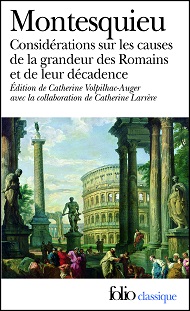
Montesquieu (18 januari 1689 – 10 februari 1755)
Cover
De Roemeense schrijver en journalist Ioan Slavici werd geboren op 18 januari 1848 in Siria. Zie ook alle tags voor Ioan Slavici op dit blog.
Uit: Popa Tanda (Vertaald door Lucy Byng)
“Then Father Trandafir reached this penitential spot. He could not expect to do as the others had done, come one day, stay the next, and depart the third. He was too much out of favour with the archdeacon to imagine that he would send him to another village. He could not remain without a village: a priest without a village—a cart without a wheel, a yoke without oxen, a hat on the top of a wig. He began to think what he must do; he must take things as they were, and stay gladly in Saraceni. It was only a village in name, but no one could say he was a priest without a village. But really a more suitable priest for a more suitable village you could not have found. The poverty of the priest corresponded to the poverty in the homes of his parishioners. From the beginning Trandafir realized one thing: it was much nicer in Butucani than in Saraceni. There the people all had something, and you could always have some of it. In Saraceni all the latches were made of wood. Then the Father reflected: the priest did all the business of the town, but the town took care of the priest’s purse. Before long the Father began to feel sure that the people who started by being charitable and hospitable were not born fools. “It is a wise thing when men meet together to comfort and cheer each other. Even our Redeemer began with almsgiving, and the wedding at Cana of Galilee.” Thus thought Father Trandafir; but in Saraceni there was neither almsgiving nor hospitality.
“There is one thing,” said the Father to himself a little later on, “in a poor village there is no corn for the priest to gather. As long as the people of Saraceni are lazy, so long shall I be hungry!” And he began to think how he was going to make his parishioners industrious. The industrious man eats the stones, makes soup out of the stagnant water, and reaps corn where the hemlock used to grow. “Then”—concluded the priest—”when the cow has fodder she is no longer dry!”
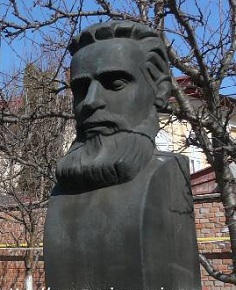
Ioan Slavici (18 januari 1848 – 17 augustus 1925)
Borstbeeld in Iaşi
De Nicaraguaanse schrijver Rubén Darío werd geboren in Metapa, tegenwoordig Ciudad Darío, op 18 januari 1867. Zie ook alle tags voor Rubén Darío op dit blog.
Symphony In Grey Major
The sea like a vast silvered mirror
reflects the sky like a sheet of zinc;
distant flocks of birds make stains
on the burnished pale grey background.
The sun, like a round, opaque window
with an invalid’s steps climbs to the zenith;
the sea wind relaxes in the shade
using its black trumpet as a pillow.
The waves that move their leaden bellies
seem to moan beneath the pier.
Sitting on a cable, smoking his pipe,
is a sailor thinking of the beaches
of a vague, distant, misty land.
This sea-dog is old. The fiery beams
of Brazilian sun have tanned his face;
the wild typhoons of the China sea
have seen him drinking his bottle of gin.
The iodine and saltpetre foam
long has known his ruddy nose,
his curly hair, athletic biceps,
his canvas cap, his blouse of drill.
Surrounded by tobacco smoke
the old man sees the far off misty land
for which one hot and golden evening
his brig set out with all sails set …
The siesta of the tropics. The sea-dog sleeps.
Now the shades of grey enfold him.
It is as if an enormous soft charcoal
rubbed out the lines of the horizon’s arc.
The siesta of the tropics. The old cicada
tries out his senile, raucous guitar
and the cricket strikes up a monotonous solo
on the single string of his violin.
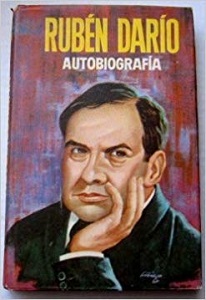
Rubén Darío (18 januari 1867 – 6 februari 1916)
Cover autobiografie
De Franse schrijver Paul Léautaud werd geboren op 18 januari 1872 in Parijs. Zie ook alle tags voor Paul Léautaud op dit blog.
Uit: Journal littéraire
« 11 mars 1938
Cet illuminé qui se croit un homme d’État, ce niais dans ses vues sociales, ce faible et pleurard, – comme Gide dans son illuminisme pour la Russie des Soviets, s’enthousiasmant sans rien savoir et quand il a vu la réalité, tombant de son haut. Et on voit tous ces coquins politiques se faire photographier en riant (il y a encore deux jours, dans un journal, Pierre Cot et Jean Zay).
Parlé aussi avec Gérin de l’abaissement de tout dans la société d’aujourd’hui. Très curieux, ce garçon de 23 ans, ancien ouvrier mineur, écrivant dans des journaux d’extrême gauche, me disant qu’il cesse peu à peu d’être républicain, démocrate, qu’il faut de l’ordre, de la hiérarchie, chacun à sa place et qu’il découvre peu à peu que la monarchie avait ses mérites et que, pour la liberté, il n’est pas si sûr qu’on ait gagné au change. Ce qui prouve bien que le milieu ne fait rien, mais le tempérament, le caractère, la sensibilité, et qu’on peut être aristocrate tout en étant un ancien ouvrier mineur.
Parlé des atteintes qu’a subies de tout cela la littérature, les moeurs littéraires, la profusion de la production, les éloges démesurés à tout propos, les rapprochements à chaque instant avec tel écrivain célèbre : on est un nouveau Balzac à bon marché, la médiocrité de la critique, son manque de liberté d’ailleurs, tant par les petits échanges d’intérêts que par le veto des journaux. II arrive à dire qu’il manque un Sainte-Beuve, qui ne serait peut-être plus possible d’ailleurs. »
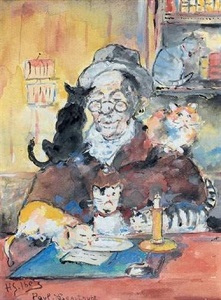
Paul Léautaud (18 januari 1872 – 22 februari 1956)
Portret van Léautaud met zijn katten door Henri Gabriel Ibels, z.j.
De Britse dichter en schrijver Alan Alexander Milne werd geboren op 18 januari 1882 in Londen. Zie ook alle tags voor Alan Alexander Milne op dit blog.
Vespers
Little Boy kneels at the foot of the bed,
Droops on the little hands little gold head.
Hush! Hush! Whisper who dares!
Christopher Robin is saying his prayers.
God bless Mummy. I know that’s right.
Wasn’t it fun in the bath to-night?
The cold’s so cold, and the hot’s so hot.
Oh! God bless Daddy – I quite forgot.
If I open my fingers a little bit more,
I can see Nanny’s dressing-gown on the door.
It’s a beautiful blue, but it hasn’t a hood.
Oh! God bless Nanny and make her good.
Mine has a hood, and I lie in bed,
And pull the hood right over my head,
And I shut my eyes, and I curl up small,
And nobody knows that I’m there at all.
Oh! Thank you, God, for a lovely day.
And what was the other I had to say?
I said ‘Bless Daddy,’ so what can it be?
Oh! Now I remember it. God bless Me.
Little Boy kneels at the foot of the bed,
Droops on the little hands little gold head.
Hush! Hush! Whisper who dares!
Christopher Robin is saying his prayers.
Solitude
I have a house where I go
When there’s too many people,
I have a house where I go
Where no one can be;
I have a house where I go,
Where nobody ever says ‘No’;
Where no one says anything- so
There is no one but me.
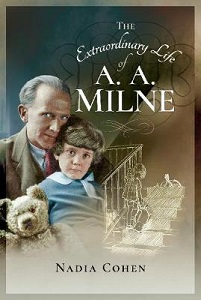
Alan Alexander Milne (18 januari 1882 – 31 januari 1956)
Cover biografie
Zie voor nog meer schrijvers van de 18e januari ook mijn blog van 18 januari 2015 deel 2 en ook deel 3.

